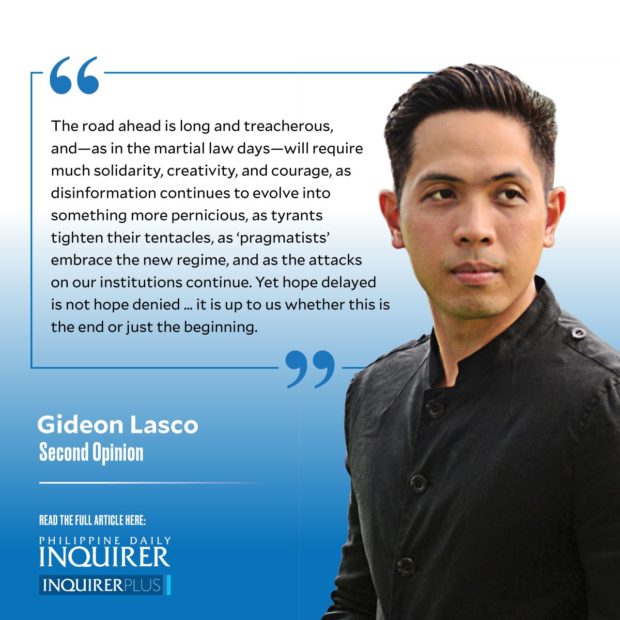Hope delayed is not hope denied
I was in the womb when the Filipino people ousted the Marcoses in what became known as the Edsa People Power Revolution. The grownups around me, and later on my history teachers, never held any illusions about what happened after 1986, but the truth was clear to me then as it is clear to me now: that the Marcoses were exceptional in the scale of their corruption, the pervasiveness of their use of propaganda, and the extent of the cruelty and torture under their regime.
My first visit to Ilocos Norte, chronicled in my travel journal dated Dec. 28, 2005, sums up my teenage impressions of Ferdinand Marcos, as well as my assumption (very much misguided in hindsight) that he belonged to the past:
“In this poorly-maintained, undermanned museum lies the body of Ferdinand Marcos, the man who declared that ‘this nation can be great again’ but worked for the opposite. Corrupted by power, he is but a name in the history books, a myth, an ancient villain. Sayang. The mausoleum is small yet dignified. Therein lay Marcos, body covered with wax and make-up, encased in glass. The presidential seal and the Philippine flag accompany him in his solitude. The background music of elegiac tunes was no different from those in Enchanted Kingdom. No longer in power, Marcos is a lonely museum item in his hometown.”
Today, as Ferdinand “Bongbong” Marcos Jr. ascends to the nation’s highest office, the Marcoses’ comeback is seemingly complete, with President Duterte having paved the way for their full rehabilitation and ascent. Even the “museum item” I saw is in the Libingan ng mga Bayani. Not only will their family be back in Malacañang, but they will hold a seat in the Senate, two seats in Congress, and multiple local offices. No one who loves the country and knows what the Marcoses have done would ever have voted for Marcos Jr., but such is the power of disinformation that he has gained the most votes ever for a Filipino presidential candidate.
Alas, his candidacy gives no reason to expect that his presidency will be any different from his father or his predecessor in terms of respecting our democratic institutions, protecting human rights, pursuing a fair, inclusive, and meritocratic government, and responding adequately to the crises of our time. Already, the presumptive next president is saying Sara Duterte will be his pick for Department of Education secretary, a decision that speaks for itself in terms of his administration’s values. As UP Diliman’s Jean Encinas Franco put it, “Good luck na lang talaga sa Pilipinas.”
Still, the historic campaign of Vice President Leni Robredo leaves open the possibility that our best hopes for the country have not been denied, only delayed. Admittedly, many of us are at the lowest point of our optimism today, not just because of Marcos Jr.’s victory but the defeat of all those candidates who could have served the country well: Chel Diokno, Neri Colmenares, Leila de Lima, and many others were soundly defeated by the likes of Robin Padilla and Jinggoy Estrada.
Despite the outcome, however, the “people’s campaign” was real, far more real than Yamashita’s treasure or Tallano gold. And far from being passive voters, many of the people behind this campaign were active volunteers, believing not just in their candidates but in the larger principles they share. Thus, notwithstanding years of vicious propaganda against her, Leni actually won more votes now than in 2016, and managed to cobble together an unlikely coalition along the way.
Will Leni be willing to continue leading this coalition toward resistance? Will others step up in the battle for the heart and soul of our nation that is increasingly waged online? The Kakampink rallies may have felt at times like a street party or—thanks to the musicality of our people, as well as many celebrities finally finding their voice—a concert. And perhaps this, too, is a welcome legacy of the campaign: to remind people that political engagement, while a very serious matter, can also be fun.
But the road ahead is long and treacherous, and—as in the martial law days— will require much solidarity, creativity, and courage, as disinformation continues to evolve into something more pernicious, as tyrants tighten their tentacles, as “pragmatists” embrace the new regime, and as the attacks on our institutions continue.
Yet, hope delayed is not hope denied. The political elites may have won the battle through their machinations and massive disinformation, but it is up to us whether this is the end or just the beginning.
—————-
glasco@inquirer.com.ph





















